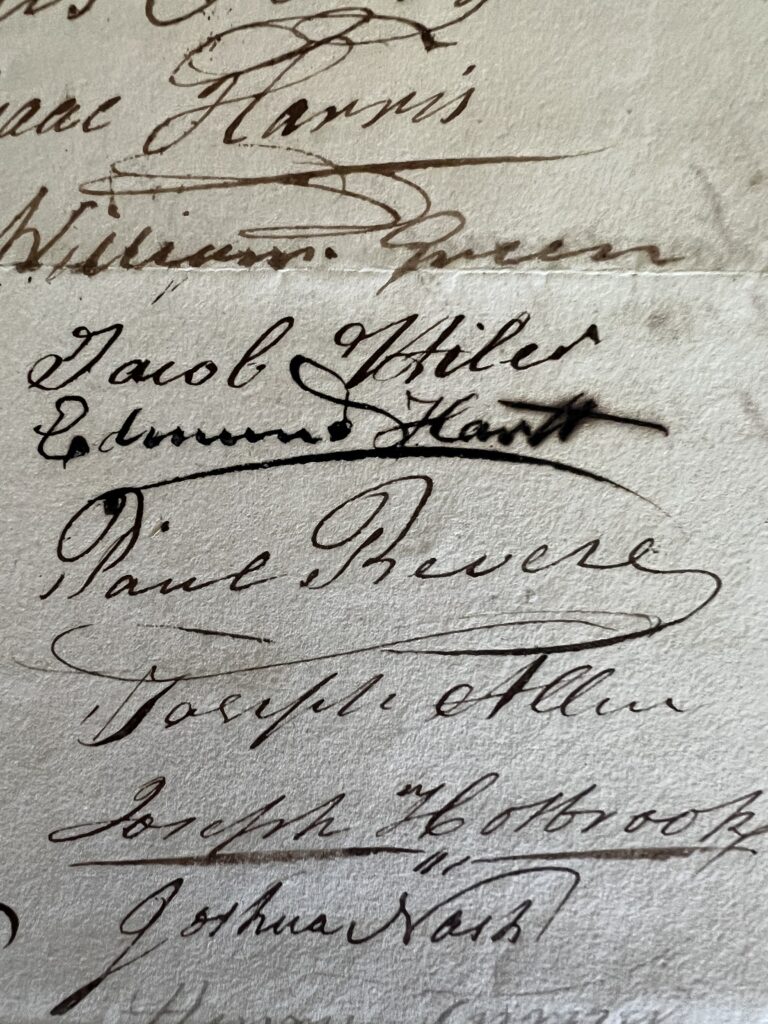TRULY HISTORIC PETITION IN WHICH PAUL REVERE EXPRESSES “THE MOST ESSENTIAL RIGHT OF CITIZENS TO ASSEMBLE” AGAINST AN “UNNECESSARY & RUINOUS SYSTEM (THAT) HAS BEEN COMPLETED BY AN ACT WHICH VIOLATES EVERY PRINCIPLE OF CIVIL LIBERTY & LEAVES US ONLY THE DREADFUL ALTERNATIVE OF SLAVERY OR RESISTANCE IN A CONSTITUTIONAL WAY”
Revere, Paul (1735-1818) American silversmith and patriot best known for his 1775 “midnight ride” warning American revolutionaries of the British advance on Lexington and Concord. Document signed (”Paul Revere”). 2pp. Folio. Boston, N.d. (1808-1809). An historic manuscript document addressed to the selectmen of Boston, signed by Revere and 23 other businessmen, including several ships’ captains, protesting the Embargo Act of 1807.
In full:
Whereas, it is the undoubted right of the citizens of this State to assemble at all times, peaceably & to express their opinions upon their public affairs.
And whereas, at no period in the History of this Country has there existed so strong a necessity of exercising this most essential right of the citizen,
In as much, as the public & private distress under which they are now suffering is unexampled in extent & unlimited in degree,
In as much, as a system of measures, unnecessary & ruinous to the commercial States has been adopted & preserved in,
In as much, as the respectful petitions & remonstrances of the Inhabitants of this Town & of the Legislature of the State, have been treated with indignity & contempt,
In as much, as that we are scourged with internal distress and threatened, of the only relief of the scenes of Calamity with Foreign war,
In as much, as the consummation of this unnecessary & ruinous system has been completed by an act which violates every principle of civil liberty & leaves us only the dreadful alternative of Slavery or a resistance in a constitutional way,
In as much, in fine, as our only hope reposes upon the wisdom, the patriotism, the protecting arm and the firmness of our State Legislature,
The Subscribers request that a meeting of the Freeholders & other Inhabitants of this Town, may be immediately called to take into consideration the alarming situation of our public affairs, to express their solemn opinion thereon, to address the Legislature of this State (if they shall see cause) to interfere for their constitutional relief of the late arbitrary, unnecessary & unjust violations of the rights of the People & to take such other peaceable and orderly measures as to the said inhabitants may seem proper & expedient & as in duty bound &”.
Although best known for his famous midnight ride to warn American citizens of the advance of British troops and his service during the Revolution as a militiaman, Paul Revere was an innovative entrepreneur and silversmith who enjoyed a long and profitable post war career. He branched out from his work in silver to cast church bells, cannon, copper bolts, and other military and naval products. At the turn of the 19th century, he discovered a technique for rolling copper sheeting, which was used on the Massachusetts State House and in shipbuilding.
In response to the British and French violation of American neutrality – including the impressment of American merchantman and seizure of American cargo – the United States enacted an embargo on the two warring European powers rather than become embroiled in their conflict. The Embargo Act of 1807, a political failure championed by President Thomas Jefferson, was enacted in December and placed a heavier burden on American merchants than on the French or British. Subsequently, it was both widely unpopular and largely flouted. Protests were especially widespread in New England, a region heavily dependent on shipping, and our petition is a fine example of such a protest.
Revere’s connection to the shipbuilding industry would have been one factor in his opposition to the Embargo Act, but another would have been his staunch Federalist beliefs. Federalism advocated a strong centralized system of government and a mercantile economy that stood in opposition to Jeffersonian democracy, which idealized the republic and an agrarian economy. The Embargo Act, the embodimemt of a strong federal overnment, was criticized by the Federalists for going too far and violating individual liberties, a concept reiterated in our document. The Embargo Act’s unpopularity led to many Federalist electoral victories in the 1808 elections, and the act was revoked roughly a year after its passage, during the waning days of Jefferson’s presidency.
Last offered at the Sotheby’s Sang Sale of 1980.
